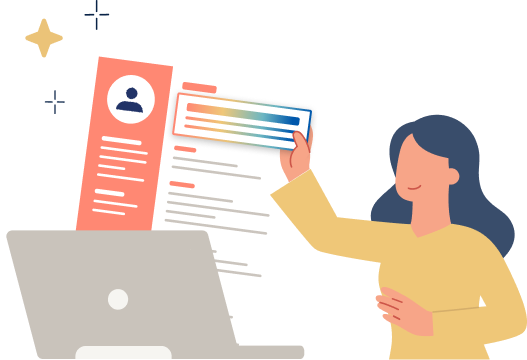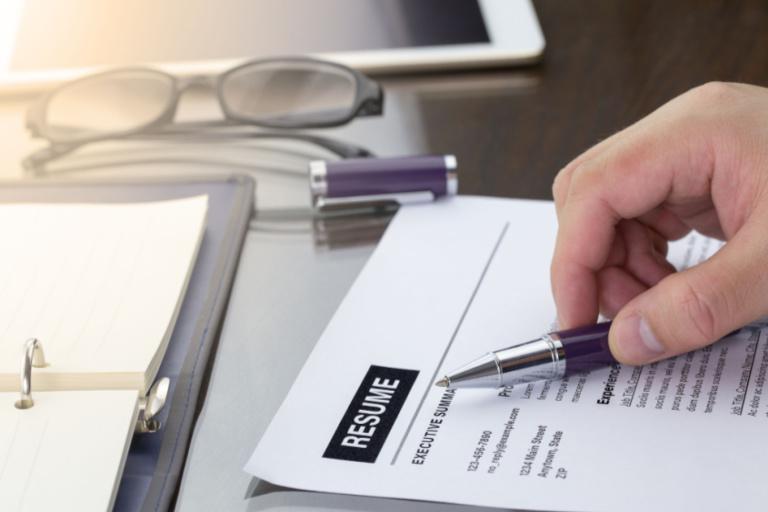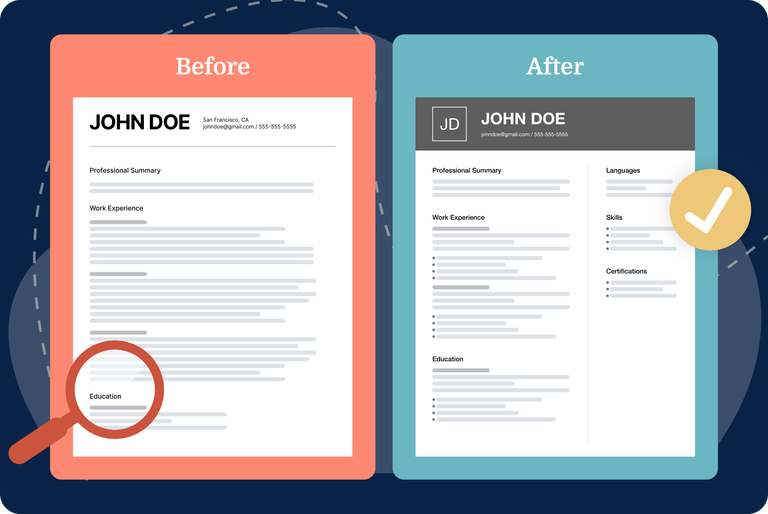Education Skills for a Resume (Examples & Tips)

Our customers have been hired at: *Foot Note
AI Resume Skills Generator

Education professionals are pivotal in shaping the future by nurturing students’ minds and talents. They serve as mentors, guides and facilitators, creating environments that foster curiosity, critical thinking and lifelong learning. Education jobs span various roles and responsibilities across multiple sectors, including teachers, administrators, counselors, tutors and librarians.
The US Bureau of Labor Statistics predicts that jobs in education will grow about as fast as the average for all occupations through 2032, with approximately 857,600 job openings expected each year, on average. To snag one of those positions, you must write a stellar resume and cover letter and have the right education skills for the job.
Make a resume with MyPerfectResume
Our Resume builder can help you write the perfect resume. Start Now!
What are education skills?
Education skills are the knowledge, competencies and qualities that education workers use to perform their jobs. These skills include hard skills, like lesson planning and research, and soft skills, like communication and patience. They also require technical knowledge and tools specific to their occupations.
Examples of education skills
Hard skills
Hard skills are teachable, tangible, job-specific abilities that can be quantified and measured. They are typically learned through training and experience. Examples of hard education skills include:
- Classroom management
- Assessment
- Evaluation
- Content area expertise
- Strategic planning
- Budgeting
- Management
- Policy development
- Safety and security
- Legal and regulatory compliance
Soft skills
Soft skills are fundamental for education workers because they are fundamental to building positive relationships, communicating effectively and supporting others. Here are ten soft skills for education professionals:
- Flexibility
- Conflict resolution
- Verbal and written communication
- Cultural competence and inclusion
- Adaptability
- Critical thinking
- Problem-solving
- Creativity
- Stress management
- Lifelong learning
Technical skills
Technical skills help education workers to adapt to the changing demands of the education industry, leverage technology to support teaching and learning and ensure the success and well-being of students. Here are some top technology education skills:
- Database management
- Learning management systems (LMS)
- Virtual classroom platforms
- Podcasting
- Internet of Things (IoT)
- e-learning course development
- Online collaboration tools
- Learning analytics
- Artificial intelligence (AI)
- Audio/visual editing
Interpersonal skills
Interpersonal skills By continually developing and honing their interpersonal skills, educators can create a more positive and impactful educational experience for their students and contribute to the overall success of the educational community.
Key interpersonal skills for education workers include:
- Motivation
- Inspiration
- Advising
- Mentoring
- Collaboration
- Relationship building
- Empathy
- Positive reinforcement
- Respect
- Active listening
Transferable skills
Transferable skills help education professionals adapt to changing situations, be resilient enough to face challenges and navigate diverse tasks.
The following transferable education skills will help ensure you are an A+ job candidate.
- Organization
- Emotional intelligence
- Resilience
- Decision making
- Networking
- Versatility
- Advocacy
- Time management
- Literacy
- Cultural competence
How to improve your education skills
Developing your education skills for a career in education requires a multifaceted approach. Here are some ways you can hone yours:
- Keep learning: Engage in professional development opportunities such as workshops, conferences, and seminars to stay updated on best practices, pedagogical trends, and educational advancements.
- Take time to reflect: Regularly reflect on your work. Think about what is going well and why, then identify the areas you can improve.
- Collaborate with colleagues: Engage with your colleagues to share insights, resources, and education strategies. Share your observations, exchange ideas for improvement and be open to feedback.
- Stay abreast of new technologies and techniques: Explore and integrate the latest educational technologies to enhance your work and the educational process.
- Develop cultural competence: Learn about your students' cultural backgrounds, experiences, and perspectives and incorporate strategies and tactics to ensure an inclusive learning environment at your institution.
How to highlight education skills on your resume
Be thoughtful and deliberate when adding education skills to your resume. Create a dedicated skills section to display your skills and include various job-relevant skills throughout your resume to make a more substantial impact.
Here’s how to display your education skills in your resume in six steps:
- First, consider your resume format. Each format will display your skills differently, depending on your work experience and goals.
- Next, choose a resume template to ensure your resume is formatted correctly.
- Review the job description and match your education skills and accomplishments to the job requirements and “nice-to-have” job qualifications.
- Add two or three job-relevant skills to your professional summary or resume objective so employers know you are a good fit.
- Use your work history section to show what you can accomplish with your education skills. For example, “Led a team of 20 teachers in the development and execution of a curriculum overhaul, resulting in a 40% improvement in student comprehension and retention rates.”
- Create a skills section and add five to ten of your strongest education skills.
Pro tip: Consider creating skill categories to emphasize specific education skills, like “Interpersonal Skills” and “Technical Skills.”
Common tools and technologies used in education
Teaching and non-teaching education jobs require diverse tools and technologies to enhance learning, administration, communication and productivity.
Here are some standard tools and technologies you can use to enhance your education skills:
- Learning management systems (LMS): LMS platforms like Moodle, Canvas or Blackboard can help manage course materials, assignments, grading and communication between teachers and students.
- Video conferencing software: Tools like Zoom, Microsoft Teams or Google Meet are essential for conducting virtual classrooms, online meetings, online professional development training and virtual parent-teacher conferences.
- Interactive whiteboards: Interactive whiteboards such as SMART Boards or Promethean Boards help teachers create dynamic, multimedia-rich lessons and engage students through interactive activities and presentations.
- Educational software applications: Programs like Khan Academy, Quizizz, or Duolingo provide supplemental learning resources, practice exercises, and gamified learning experiences for students across various subjects and grade levels.
- Assessment and evaluation tools: Tools such as Google Forms, Kahoot, or Socrative enable teachers to create quizzes, surveys, and formative assessments to gauge student understanding, track progress and create personalized plans for individual students.
- Document management tools: Systems like Google Drive, Microsoft OneDrive, and Dropbox are vital for education professionals because they facilitate collaborative document sharing, version control and file organization.
- Student information systems (SIS): Many schools use SIS platforms like PowerSchool, Infinite Campus and Skyward to manage student assessment data, including enrollment, attendance and grades.
- Communication platforms: Software like Remind, ClassDojo and Seesaw help teachers communicate with students and parents through text messages, announcements and multimedia updates.
- Virtual reality (VR) and Augmented reality (AR): VR and AR technologies provide immersive, experiential learning opportunities, simulations, virtual field trips and interactive educational content.
- Administrative software solutions: Software such as Edlio, Frontline Education, or SchoolMint helps streamline administrative tasks such as school website management, human resources tasks, payroll, scheduling and student enrollment.
Best education certifications
Getting certified for a job in education is crucial for teachers and non-teachers alike. Certification validates teachers' qualifications and expertise in delivering quality education to students and is often a requirement for the job.
Non-teaching education professionals, such as education administrators, school counselors, or instructional designers, should seek certifications in their respective fields to demonstrate their expertise.
Here are five certifications to advance your education skills:
- Education Policy
- Special Education
- National Board Certification
- Reading Specialist
- School Counselor
Key takeaways
Before you leave this guide to education skills for a resume, remember these key points:
- Education workers need various skills ranging from physical to interpersonal skills to technical aptitude to enhance students’ educational experiences.
- Continuous learning, certifications, and staying abreast of new educational tools are the most effective ways to enhance your education skills.
- Certifications in education can help you make the best possible impression on employers and can help you land your dream job in education.
- Education professionals must stay on top of the latest trends and technologies to advance in their careers.
- Display your education skills throughout your resume for the most significant impact.
- In your job history section, show how you have used your education skills by emphasizing your measurable achievements.
FAQ
What education skills should I highlight on my resume for an education job?
On your resume for an education job, highlight a mix of hard, soft and technical skills such as classroom management, curriculum development, differentiated instruction, assessment and evaluation, technology integration, and collaboration with colleagues and parents.
How can I demonstrate my education skills on a resume for an education job if I'm a new graduate with limited experience?
If you’re a new graduate, writing a resume without experience, start with a resume objective. Throughout your resume, emphasize relevant coursework, practicum experiences, student teaching placements, education internships, part-time tutoring, or volunteer work. Highlight specific examples where you applied education skills effectively, even if they were outside of traditional teaching roles.
Should I include my teaching certifications and credentials on my resume for an education job?Yes! Include relevant teaching certifications and credentials on your resume, such as a state teaching license or certifications in specialized areas like special education or ESL. In education, certifications demonstrate your qualifications and compliance with state legal requirements.
What are some effective ways to showcase my education skills on a cover letter for an education job?
In your cover letter for an education job, provide concrete examples of how you’ve applied your education skills to improve student outcomes, enhance learning experiences, or collaborate with colleagues. Use storytelling techniques and include anecdotes and accomplishments demonstrating your effectiveness in your previous jobs. Do not rehash your resume.
How can I tailor my resume for an education job to highlight specific education skills mentioned in the job description?
To customize your education resume, review the job description carefully and identify key education skills, qualifications, and bonus skills that will set you apart from other job candidates.
Is it important to include professional development and training related to education skills on my resume for an education job?
Yes. To make a positive impression on potential employers, include relevant professional development and training related to education skills on your resume, such as workshops, seminars, conferences, or courses you have taken.
How should I format my resume for an education job to effectively showcase my education skills?
Format your resume for an education job with clear headings, an appropriate resume font, bullet points to display each job or relevant experience and education skills, and a professional layout that is easy to read. Useaction verbs and quantifiable results whenever possible. Our resume templates will help ensure your education resume is formatted professionally.
Can I include transferable skills from previous non-education jobs on my resume for an education job?
Yes, you should include transferable skills from previous non-education jobs on your resume for an education job if they are relevant to the position. For example, communication, organization, leadership and problem-solving skills are valuable to employers in education.
How can I ensure my resume is ATS-friendly?
To ensure your resume is ATS-friendly:
- Use a simple resume template with standard fonts, minimal formatting with standard section headings and job titles, an optimized file format (such as .docx or .pdf), and spell out acronyms.
- Proofread your resume carefully.
- Avoid graphics, photographs and images.
- Use keywords from the job description.
- Use an ATS compatibility checker.
- Use a resume builder to ensure your resume meets all ATS requirements.
What tips do you have for writing a resume for an education job that stands out to hiring managers?
To write a standout resume for an education job, constantly tailor your resume to the specific job, highlight your measurable accomplishments rather than write out your tasks for previous employment, proofread your resume more than once and include a certifications or training section to spotlight your commitment to ongoing learning in your field.
How we reviewed this article
Since 2012, we have helped more than 11 million job seekers. We want to make your career journey accessible and manageable through our services and Career Center’s how-to guides and tips. In our commitment to bring you a transparent process, we present our Editorial Process.
Sources
- IBIS World. No author.Educational Services in the US - Market Size, Industry Analysis, Trends and Forecasts (2024-2029)
- Skills You Need. No Author. Careers in Education.
- United States Bureau of Labor Statistics. No Author. Occupational Outlook Handbook. Educational Instruction and Library Occupations
- University of Massachusetts Global. No Author. Top career paths for education graduates
Our customers have been hired at:*Foot Note










